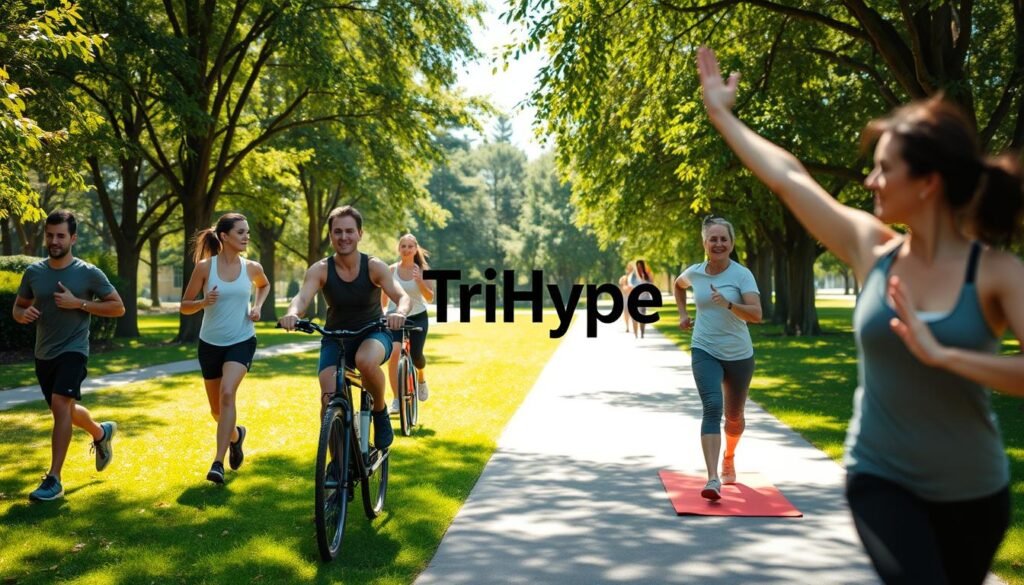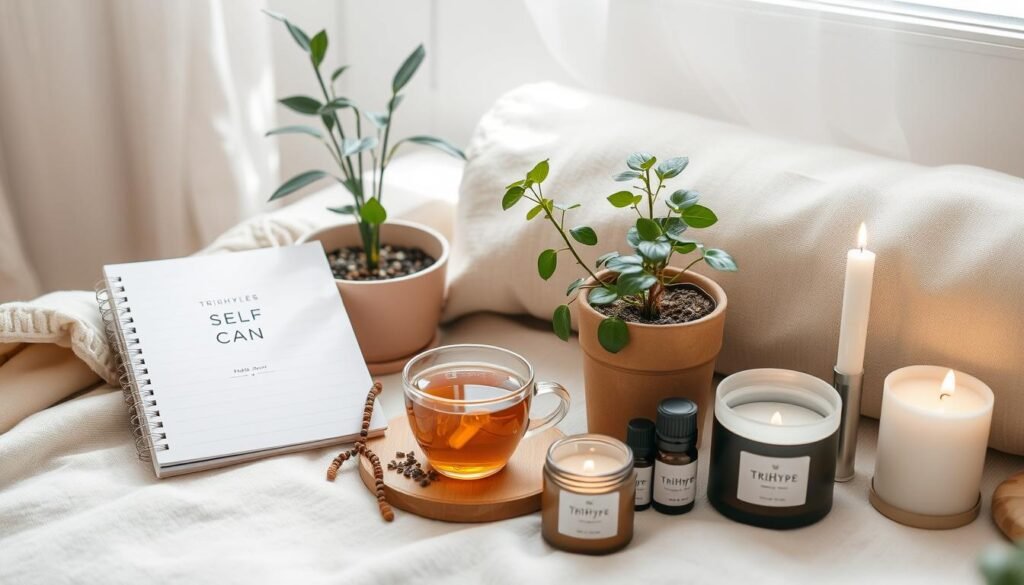As the sun peeked through the curtains, Samantha took a deep breath and stretched her arms overhead. Today, she was determined to prioritize her self-care routine. She wanted to start the day with balance and rejuvenation. She knew that taking care of her mental, emotional, and physical health was key to a fulfilling life.
In our fast-paced world, it’s easy to forget our own needs. But by embracing self-care routines for well-being, we can find inner peace. We can also boost our emotional well-being and live a healthier, more balanced life. Let’s explore effective strategies and techniques to thrive in all areas of life.
Key Takeaways
- Discover the importance of self-care and its benefits for overall well-being
- Establish a positive morning routine to set the tone for the day
- Incorporate mindfulness practices, such as meditation and journaling, for emotional well-being
- Prioritize physical activity and healthy eating habits to nourish your body
- Create a restful sleep environment and cultivate positive social connections
What is Self-Care and Why is it Important?
Self-care is key to keeping our emotional and mental health in check. It’s about doing things that help us feel good physically, mentally, and emotionally. By focusing on self-care, we can lower stress and anxiety. We also improve our mood and how we handle our emotions.
Defining Self-Care
Self-care is all about taking care of ourselves. It means making choices that help us manage stress and live a healthy life. This can be anything from practicing mindfulness to staying active and eating well.
Benefits of Prioritizing Self-Care
- Reduced stress and anxiety
- Improved mood and emotional regulation
- Increased productivity and focus
- Enhanced physical health and well-being
- Greater sense of overall life satisfaction
When we make self-care a priority, we tap into our emotional and mental well-being. Through self-care, we build strength and live a more balanced, fulfilling life.
“Self-care is not selfish. You cannot serve from an empty vessel.” – Eleanor Brownn
Establishing a Morning Routine for a Positive Start
Starting your day with a purposeful morning routine can change everything. Adding activities like meditation, journaling, or light exercise can make your day begin calmly and clearly. A consistent morning routine helps you feel more grounded and ready for the day’s challenges.
A good morning routine is key for personal growth and a healthy lifestyle. Here are some tips to make a morning routine that suits you:
- Begin with mindfulness. Just 5-10 minutes of meditation or deep breathing can center you.
- Try journaling. It’s a great way to reflect on your goals, be thankful, or sort out your thoughts.
- Do some light physical activity. A short yoga session, a quick walk, or stretching can energize you.
- Eat a healthy breakfast. Nutrient-rich foods give you the energy and focus you need for the day.
- Stay away from screens in the morning. It helps you start the day with a clear mind.
It’s important to find a morning routine that fits your life. Try different activities to see what makes you feel most alive and ready for the day.
“The way we start our day sets the tone for the rest of it. A mindful morning routine can be a game-changer for your personal growth and overall well-being.”
Mindfulness Practices for Emotional Well-Being
Keeping our emotions in check is key to feeling good and happy. Mindfulness helps a lot in this area. It can make us less stressed, better at handling our feelings, and more aware of ourselves.
Meditation and Breathing Exercises
Meditation is a core mindfulness practice. It helps us focus on the present and calm our minds. Regular meditation can also help us deal with tough emotions and find peace inside.
Breathing exercises are another great tool. They help us stay present and centered. This can be very helpful in staying calm and focused.
Journaling for Self-Reflection
Journaling is also a powerful way to improve our emotional health. It lets us reflect on our thoughts and feelings. This can help us understand ourselves better, especially when we’re dealing with hard emotions or personal issues.
| Mindfulness Practice | Benefits |
|---|---|
| Meditation | Reduced stress, improved emotional regulation, enhanced self-awareness |
| Breathing Exercises | Improved focus, decreased anxiety, heightened sense of calm |
| Journaling | Increased self-understanding, better emotional processing, personal growth |
Adding these mindfulness practices to our daily routine can greatly improve our emotional well-being. It helps us become more centered, resilient, and fulfilled.
“The present moment is filled with joy and happiness. If you are attentive, you will see it.” – Thich Nhat Hanh
Incorporating Physical Activity into Your Day
Being physically active is key for our health. Adding different exercises to our daily life boosts our physical health and energy. It also helps us sleep better and feel emotionally better. Finding exercises we like makes staying active fun and rewarding.
Workout Routines for Different Preferences
There’s a wide range of exercises for everyone. Our choices depend on what we like and our fitness goals.
- Yoga and Pilates are great for those who prefer gentle exercises. They improve flexibility and strength.
- For those who like a challenge, running, cycling, or high-intensity interval training (HIIT) are good options.
- Weightlifting or resistance band exercises are perfect for building muscle and boosting metabolism.
“Physical activity is not only a key component of a healthy lifestyle, but it also plays a vital role in supporting our emotional well-being. By finding workout routines that we genuinely enjoy, we can make exercise an integral part of our self-care routine.”

It’s important to choose exercises that fit our likes and abilities. By mixing up our workouts, we can lead a healthy life that benefits our body and mind.
Nourishing Your Body with Healthy Eating Habits
Eating right is key to taking care of ourselves. It affects our body and mind. A balanced diet, staying hydrated, and eating mindfully can boost our health and mood.
Creating healthy eating habits is a big step in self-care. Eating whole foods gives us the nutrients we need. It helps our bodies work well.
Drinking enough water is also important. It keeps our body temperature right and helps our brain work better. Try drinking water all day and eating hydrating foods too.
Eating mindfully is another good habit. It means enjoying our food and listening to our body’s hunger signals. This way, we eat better and feel more balanced.
By focusing on healthy eating, we improve our emotional well-being and balance in life. It shows us how important healthy eating habits and nourishing your body are.
Self-care routines for well-being
Adding self-care to our daily lives is key for our well-being. It’s about doing things that help our body, mind, and spirit. This section will look at different self-care routines, like managing stress and setting boundaries, to help us live better.
Managing stress and anxiety is a big part of self-care. Techniques like meditation and deep breathing exercises can calm our minds. Doing these regularly helps us handle work, family, and personal life better.
Setting clear boundaries is also important. Saying “no” to too much can keep us from burning out. It helps us protect our time and mental health, so we can recharge and focus on ourselves.
| Self-Care Routine | Benefits |
|---|---|
| Meditation and Breathing Exercises | Reduced stress and anxiety, improved focus and concentration |
| Boundary Setting | Increased productivity, better work-life balance, reduced burnout |
| Regular Physical Activity | Improved physical health, enhanced mood and mental well-being |
Adding regular physical activity to our self-care is also beneficial. It could be a walk, yoga, or a workout. Exercise boosts our mood, energy, and physical health.
By trying different self-care practices, we can take care of our whole self. This leads to being more productive, having better relationships, and feeling more at peace.

Creating a Restful Sleep Environment
Quality sleep is key to self-care and well-being. A restful sleep environment and good sleep hygiene practices can improve our sleep. This boosts our energy, brain function, and emotional well-being and healthy lifestyle habits.
Sleep Hygiene Tips
Consistent bedtime routines and less screen time before bed are crucial. Here are more tips for a restful sleep environment:
- Keep your bedroom cool, dark, and quiet for better sleep.
- Choose a comfy, supportive mattress and pillows to avoid discomfort.
- Avoid caffeine, alcohol, or big meals before bed to prevent sleep disruption.
- Do relaxing activities like reading or stretching before bed to relax.
- Stick to a regular sleep schedule, even on weekends, to keep your body’s rhythm.
By following these sleep hygiene tips, you can make a restful sleep environment. This supports your emotional well-being and healthy lifestyle habits.
“Sleep is the golden chain that ties health and our bodies together.” – Thomas Dekker
| Sleep Hygiene Tip | Benefits |
|---|---|
| Maintain a cool, dark, and quiet bedroom | Promotes better sleep and melatonin production |
| Invest in a comfortable mattress and pillows | Reduces discomfort and improves sleep quality |
| Avoid caffeine, alcohol, and large meals before bed | Prevents disruptions to the sleep-wake cycle |
| Engage in relaxing activities before bed | Helps the body and mind transition to sleep |
| Stick to a consistent sleep schedule | Regulates the body’s natural sleep-wake cycle |
Cultivating Positive Relationships and Social Connections
Building strong positive relationships and social connections is key for our emotional well-being. It makes us feel happy and fulfilled. Talking to others, having a supportive group, and sharing openly are important.
Spending quality time with family and friends is essential. It’s also important to know when to say no and listen well. This helps us feel connected and balanced in life.
- Nurture meaningful relationships with family, friends, and community
- Engage in regular social activities and shared experiences
- Practice active listening and open communication
- Set boundaries to maintain a healthy balance
- Seek support from trusted loved ones when needed
| Relationship Factor | Positive Impact | Negative Impact |
|---|---|---|
| Communication | Strengthens understanding and intimacy | Leads to misunderstandings and conflicts |
| Time Spent Together | Fosters a sense of belonging and connection | Can contribute to feelings of loneliness and isolation |
| Emotional Support | Provides a safety net and sense of security | Lack of support can lead to increased stress and anxiety |
By focusing on positive relationships and social connections, we boost our emotional well-being. This also helps us balance work and life better. It lays a solid base for a happy life.

Pursuing Hobbies and Creative Outlets
Doing hobbies and creative activities is a great way to take care of ourselves. Exploring activities that make us happy and proud can reduce stress and improve our mood. Whether it’s painting, gardening, playing music, or cooking, these activities can change our lives for the better.
Finding Inspiration and Sparking Joy
Finding the right hobbies and creative outlets is key. It’s about finding activities that excite and fulfill us. This could be trying a new art form, diving into a favorite craft, or finding a sport that fits our interests and fitness level. These activities help us connect with our emotions and find happiness in the moment.
Regularly doing hobbies and creative outlets greatly benefits our mental health. Research shows they can lower stress, improve mood, and give us a sense of purpose. By making time for these activities, we focus on our well-being and open up to personal growth and happiness.
“The biggest adventure you can take is to live the life of your dreams.” – Oprah Winfrey
| Hobby | Benefits |
|---|---|
| Painting | Reduces stress, boosts creativity, and promotes mindfulness |
| Gardening | Connects us with nature, improves mood, and provides a sense of accomplishment |
| Cooking | Enhances problem-solving skills, encourages experimentation, and fosters a sense of nourishment |
By making hobbies and creative outlets a part of our self-care, we open up to growth and well-being. Whether it’s something we’ve always loved or something new, these activities can deeply change our lives and help us discover who we truly are.
Managing Stress and Anxiety through Self-Care
Good self-care includes ways to handle stress and anxiety. Relaxation techniques help calm our minds and reduce tension. They help us stay balanced and strong, even when things get tough.
Relaxation Techniques
Relaxation techniques can really help with stress and anxiety. Here are some good ones to try:
- Deep Breathing Exercises: Take slow, deep breaths, focusing on the inhalation and exhalation. This can promote a sense of calm and reduce physical tension.
- Progressive Muscle Relaxation: Systematically tense and release different muscle groups in your body, allowing you to release built-up stress.
- Guided Imagery: Visualize a peaceful, serene scene, immersing yourself in the details and sensations to transport your mind to a calmer state.
Adding these relaxation techniques to your daily routine can help with stress, anxiety, and improve emotional well-being. Taking time to relax helps you find a better work-life balance and keeps your mind strong.

“The greatest weapon against stress is our ability to choose one thought over another.” – William James
Setting Boundaries and Saying No
In today’s fast world, we often feel overwhelmed. It’s key to set healthy boundaries and say “no” for self-care. This helps us keep a good balance between work and life, and protects our mental health.
Setting boundaries means knowing our limits and telling others. This might mean saying no to things that don’t fit our values or schedule. It also means having time just for ourselves, without interruptions. Saying no is hard, but it’s crucial for our work-life balance and mental health awareness.
- Identify your priorities and non-negotiables
- Communicate your boundaries clearly and respectfully
- Practice saying no without guilt or over-explaining
- Delegate tasks or find creative solutions when possible
- Protect your time and energy for self-care activities
By setting healthy boundaries and learning to say no, we make room for what’s important. This helps us avoid burnout and be better in our personal and work lives.
“The difference between successful people and really successful people is that really successful people say no to almost everything.”
– Warren Buffett
At the heart of self-care is making choices that put our needs first. By setting boundaries and saying no, we achieve a healthier work-life balance. This keeps our mental health awareness strong, even when things get busy.
Self-Compassion and Positive Self-Talk
Self-compassion and positive self-talk are key to caring for ourselves. They boost our emotional health and mental awareness. By being kind to ourselves, we can lower self-criticism and increase self-esteem.
Using affirmations and self-reflection daily can make our inner voice more supportive. When we’re kind to ourselves, we face challenges better. We learn from mistakes and stay positive.
Practicing self-compassion means:
- Knowing our feelings without judging
- Treating ourselves like a close friend in need
- Accepting our flaws as part of being human
This approach improves our emotional health and self-love.
“Self-compassion is about treating ourselves with the same kindness, care, and understanding we would offer to a good friend.”
Positive self-talk is about replacing negative thoughts with positive ones. This practice helps us see challenges differently. It builds confidence and keeps us positive.

By being kind and positive to ourselves, we build a stronger bond with ourselves. This improves our well-being and life quality.
Incorporating Nature into Your Self-Care Routine
Connecting with nature can change our lives for the better. Spending time outside, whether walking, gardening, or just looking around, brings many benefits. It helps our mind, heart, and body feel better.
Outdoor Activities for Well-Being
Doing things in nature can lower stress and make us happier. Activities like hiking, camping, bird-watching, and forest bathing are great. They help us feel more connected and thankful.
Even a short walk in a park can bring peace and refreshment. Making nature a part of our self-care can improve our well-being. It helps us find balance in our lives.
“In every walk with nature, one receives far more than he seeks.” – John Muir
Let’s use nature’s healing power in our self-care. By choosing outdoor activities, we can improve our mind, body, and soul. This way, we can enjoy the many benefits of nature-based self-care.
Building a Personalized Self-Care Plan
Making a self-care plan that fits you is key to feeling good. Think about what you need and want, and how you live your day. Try different things, find what works for you, and change your plan as needed. This way, self-care becomes a part of your life that feels right.
To make a self-care plan that’s just for you, follow these steps:
- Think about what’s most important to you. Is it your health, happiness, work-life balance, or friends?
- Look at what self-care you’re already doing. See if it really helps you.
- Try out new self-care activities. See if things like mindfulness, exercise, or art make you feel better.
- Make self-care a regular part of your day. Add it to your schedule so it’s always there.
- Check and update your plan often. Make sure it still helps you feel good.
Creating a self-care plan that’s yours can help you live healthier and happier. It’s about finding what works for you, not following someone else’s plan. Self-care is a journey of discovery and growth.
| Self-Care Activity | Benefits | Frequency |
|---|---|---|
| Morning Meditation | Reduces stress, improves focus | Daily |
| Evening Journaling | Promotes self-reflection, emotional well-being | 3-4 times per week |
| Weekend Hikes | Enhances physical fitness, connects with nature | Bi-weekly |
Your self-care plan should reflect what you need and like. By taking the time to make and keep this plan, you can focus on your well-being. This leads to a more fulfilling and balanced life.

“The best way to take care of the future is to take care of the present moment.” – Thich Nhat Hanh
Building Resilience in Life: Strategies for Success
Conclusion
Putting self-care routines first is a journey that changes our lives. It boosts our mental health awareness, emotional health, and physical health. By trying different self-care practices, like mindfulness and setting boundaries, we achieve a better work-life balance.
Remember, self-care is personal. It’s important to find what works for you.
Start your journey with self-care today. It will lead to better well-being and personal growth. Invest in your self-care routines and see the amazing changes in your life.
As we face the ups and downs of life, let’s keep focusing on our well-being. A life of self-care unlocks our full potential. We can live more joyful, meaningful lives.
